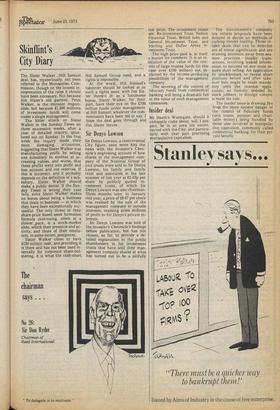Skinflint's City Diary
The Slater Walker /Hill Samuel deal, has, mysteriously, not been referred to the Monopolies Commission, though on the loosest interpretation of the rules it should have been necessary. Not because Jim Slater's old partner, Peter Walker, is the minister responsible, but because 0,500 millions of investment funds will come under a single management.
The bitter attack on Slater Walker in the Sunday Times on three successive weeks, after a year of detailed inquiry, spluttered out on Sunday. In the first week the inquiry made their most damaging accusation, suggesting that Slater Walker was manufacturing profit by selling one subsidiary to another at increasing values, and worse, that these profits went into profit and loss account and not reserves. If this is incorrect, and it probably depends on the definition of a subsidiary, Slater Walker should make a public denial. If the Sunday Times is wrong their case falls, since Slater Walker makes no bones about being a business that deals in business — at which they have been exceptionally successful. The only threat to their share-price based asset formation formula continuing, albeit at a slower pace, is a stock-market slide, which their presence and activity, and those of their emulators, to some extent, postpones.
Slater Walker claim to have £130 million cash, and providing it is there and has not been used internally for corporate share-bolstering, it is what the cash-short Hill Samuel Group need, and a rights is impossible. At the worst, Hill Samuel's takeover should be looked at as such a rights issue, with Jim Slater thrown in as a handsome bonus. Slater Walker, for their part, have their eye on the e700 million funds under management at Hill Samuel, whatever the commentators have been led to say. I hope the deal goes through and Jim Slater leaves
Sir Denys Lawson
Sir Denys Lowson, a controversial City figure, once more hits the news with the Investor's Chronicle's engrossing account of how shares in the management company of the National Group of unit trusts were sold to Sir Denys Lowson, his family and family trust and associates in the late summer of last year at 62-63p per share by publicly quoted investment trusts, of which Sir Denys Lowson was also chairman. Three months later, in January this year, a price of 0.67 per share was realised by the sale of the management company to outside interests, realising some millions of profit to Sir Denys'i private interests.
Sir Denys Lowson was told of the Investor's Chronicle's findings before publication, but has not chosen, so far, to provide a detailed explanation to the public shareholders in his investment trusts that have sold their management company shares at what has turned out to be a pitifully low price. The investment trusts are: Re-investment Trust, Nelson Financial Trust, British Isles and General Investment Trust, and. Sterling and Dollar Areas investment Trust.
The high price paid is, in itself, a matter for comment. It is an indication of the value of the control of large trustee funds (in this case over E100 million) not explained by the income-producing possibilities of the management company.
The severing of the control of Fiduciary funds from commerical banking will bring a dramatic fall in the value of such management companies.
Insider deal
Mr Heath's Watergate, should it unhappily come about, will, I suspect, be in an area not unconnected with the City, and particularly with that part practising manipulative capitalism. The Government's company law reform proposals have been delayed to decide on methods of curbing insider trading. Those insider deals that can be detected are of minor significance and are drawing attention away from seamier practices. Insider transactions, involving leaked information, to succeed on any scale require short selling. An application by stockbrokers to reveal short positions before and after takeover bids might be made mandatory until the overdue application, so fiercely resisted by stock jobbers, to divulge volume is made the rule.
The insider issue is drawing fire from the more sinister danger of the control of fiduciary funds (unit trusts, pension and charitable money) being handled by those also involved in manipulative capitalism, commonly called commercial banking, for their private benefit.


































 Previous page
Previous page